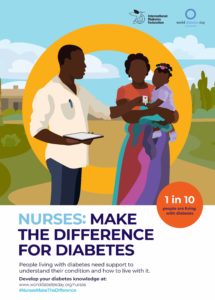
DIABETES: NURSES MAKE THE DIFFERENCE
Education is vital to support the fight against diabetes.
What is diabetes
Diabetes is a serious complex condition which can affect the entire body. Diabetes requires daily self care and if complications develop, diabetes can have a significant impact on quality of life and can reduce life expectancy. While there is currently no cure for diabetes, you can live an enjoyable life by learning about the condition and effectively managing it.
There are different types of diabetes; all types are complex and serious. The three main types of diabetes are type 1, type 2 and gestational diabetes.
How does diabetes affect the body?
When someone has diabetes, their body can’t maintain healthy levels of glucose in the blood. Glucose is a form of sugar which is the main source of energy for our bodies. Unhealthy levels of glucose in the blood can lead to long term and short term health complications.
For our bodies to work properly we need to convert glucose (sugar) from food into energy. A hormone called insulin is essential for the conversion of glucose into energy. In people with diabetes, insulin is no longer produced or not produced in sufficient amounts by the body. When people with diabetes eat glucose, which is in foods such as breads, cereals, fruit and starchy vegetables, legumes, milk, yoghurt and sweets, it can’t be converted into energy.
Instead of being turned into energy the glucose stays in the blood resulting in high blood glucose levels. After eating, the glucose is carried around your body in your blood. Your blood glucose level is called glycaemia. Blood glucose levels can be monitored and managed through self care and treatment.
Three things you need to know about diabetes:
- It is not one condition- there are three main types of diabetes: type 1, type 2 and gestational diabetes
- All types of diabetes are complex and require daily care and management
- Diabetes does not discriminate, anyone can develop diabetes
NDSS Helpline 1800 637 700
For more information on diabetes go to: www.diabetesaustralia.com.au/

